- 9 March 2019
-
Share
Share this with
These are external links and will open in a new window Read more about sharing.These are external links and will open in a new window
Related Topics
Share this with
These are external links and will open in a new window Read more about sharing.These are external links and will open in a new window
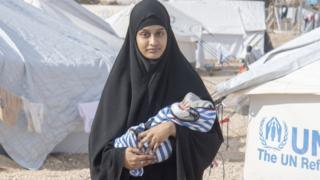
Home Secretary Sajid Javid is facing criticism after the baby son of Shamima Begum died in a Syrian camp.
Ms Begum left London to join the Islamic State group aged 15. Mr Javid revoked her British citizenship when the teenager asked to return.
A family friend said the UK had failed to safeguard the child while Labour said his death was the result of a "callous and inhumane" decision.
A UK government spokesman said the death of any child was "tragic".
The spokesman said the government had consistently advised against travelling to Syria and would "continue to do whatever we can to prevent people from being drawn into terrorism and travelling to dangerous conflict zones".
Ms Begum, who left the UK in 2015 with two school friends, was found by a journalist from the Times in a Syrian refugee camp in mid-February.
She said she had been living with her husband, a Dutch IS fighter, in IS's last stronghold and had previously lost two children, blaming the inhospitable conditions.
Nine months pregnant, she told the paper she did not regret joining IS, but that she felt the "caliphate" was at an end.
And speaking shortly after the birth of her son, Jarrah, she told the BBC she wished her child to be British and to be raised in the UK.
Jarrah died of pneumonia on Thursday, according to a medical certificate. He was less than three weeks old.
Conservative MP and former justice minister Phillip Lee urged the government to "reflect" on its "moral responsibility" for the tragedy.
He said that despite her "abhorrent views" the decision to remove Ms Begum's citizenship - and therefore deny her the chance of returning to the UK - seemed "driven by populism and not by any principle I recognise".
Conditions in the camp were "pretty appalling", with a shortage of food, blankets and tents, said the BBC's Middle East correspondent Quentin Sommerville.
Defence and security editor for the Daily Mail Larisa Brown told Newsnight there was no form of heating in the camp and the tents did not have stoves to keep children warm in temperatures that fell to 3C or 4C at night.
In three months, more than 100 people have died on the way or soon after arriving at the camp, with two-thirds of those dying aged under five.
David Miliband, former foreign secretary and president of the International Rescue Committee, said the camp faced an emergency as 12,000 "traumatised as well as deeply malnourished" people fled IS rule.
Dal Babu, a former Metropolitan Police chief superintendent and friend of Ms Begum's family, told BBC Newsnight: "We've failed, as a country, to safeguard the child."
After Ms Begum was stripped of her citizenship, her family wrote to the home secretary to say they planned to challenge the decision and asked for assistance to bring her baby to the UK.
Ms Begum's sister, Renu Begum, said in the letter Jarrah was the "one true innocent" in the situation.
As her child was born before she was deprived of UK citizenship by the Home Office, the baby would still be considered British.
"This was an entirely avoidable death of a British citizen," said Mr Babu.
"There was no attempt to help by the Home Office. I think it's shocking how the home secretary has treated this situation."
Shadow home secretary Diane Abbott also criticised the actions of the Home Office.
She tweeted: "It is against international law to make someone stateless, and now an innocent child has died as a result of a British woman being stripped of her citizenship. This is callous and inhumane."
Speaking to the BBC on Friday, before it was confirmed that the baby had died, Mr Javid said: "Sadly there are probably many children, obviously perfectly innocent, who have been born in this war zone.
"I have nothing but sympathy for the children that have been dragged into this.
"This is a reminder of why it is so, so dangerous for anyone to be in this war zone."
BBC home affairs correspondent Daniel Sandford said it might have been possible for the government to get the baby out of Syria, although that could have been "politically difficult".
"The government's position that it's impossible to go and get people out of these camps because it's too dangerous is repeatedly shown to be not entirely accurate, because journalists are able to get to these camps relatively safely.
"Working with the Red Crescent there for example, it should be possible to go and get people from the camps - if there was a political will."
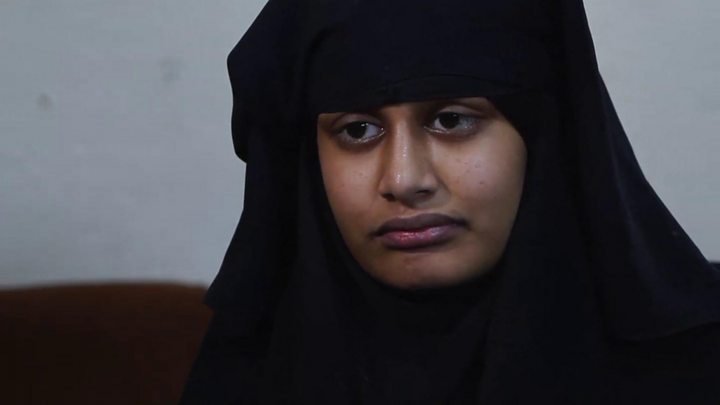
Kirsty McNeill, head of policy, advocacy and campaigns at the charity Save the Children, said "all children associated with IS are victims of the conflict and must be treated as such".
"It is possible the death of this baby boy and others could have been avoided. The UK and other countries of origin must take responsibility for their citizens inside north-east Syria," she added.
But Professor Anthony Glees, director of the Centre for Security and Intelligence Studies at the University of Buckingham, said: "The responsibility for this tragedy lies with the so-called Islamic State."
He said Shamima Begum also bears responsibility "for making the choice to leave the safety of the United Kingdom and go and be a Jihadi bride".
In an interview with the BBC after the birth of Jarrah, Ms Begum said she did not regret travelling to Syria - although she added that she did not agree with everything the IS group had done.
She added that she had never sought to be an IS "poster girl".
"I just want forgiveness really, from the UK," she told the BBC's Middle East correspondent Quentin Sommerville last month.
"Everything I've been through, I didn't expect I would go through that.
"Losing my children the way I lost them, I don't want to lose this baby as well and this is really not a place to raise children, this camp."
Share this with
These are external links and will open in a new window Read more about sharing.These are external links and will open in a new window
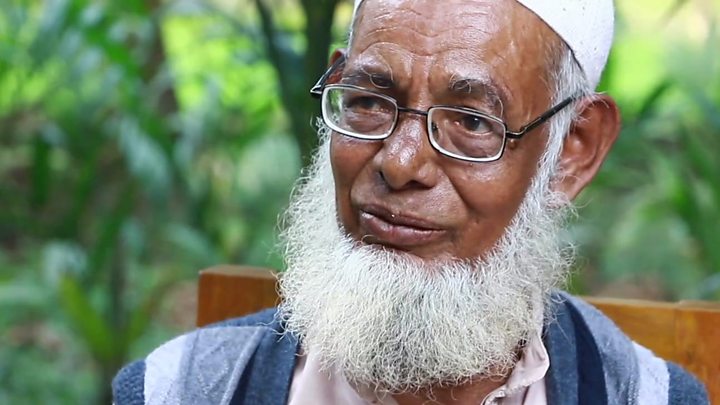
Shamima Begum's father has apologised to the British public for his daughter's decision to join the Islamic State group (IS).
Ahmed Ali said Ms Begum, who travelled from London to Syria aged 15, had "done wrong, whether or not she realised it".
Mr Ali spoke to the BBC in a village in north-eastern Bangladesh before he found out Ms Begum's baby son had died.
He said the UK should allow his daughter to return home, where she could face prosecution.
Ms Begum had her British citizenship revoked by the home secretary after she asked to return.
Ms Begum - who left the UK in 2015 - was nine months pregnant and living in a Syrian refugee camp when the Times newspaper found her in February.
She said she did not regret joining IS, but that she felt the "caliphate" was at an end.
Shortly after the birth of her son, Jarrah, she told the BBC she wished her child to be raised in the UK.
But Jarrah died of pneumonia on Thursday, according to a medical certificate. He was less than three weeks old.
As Jarrah was born before Ms Begum was deprived of UK citizenship by the Home Office, he was considered British.
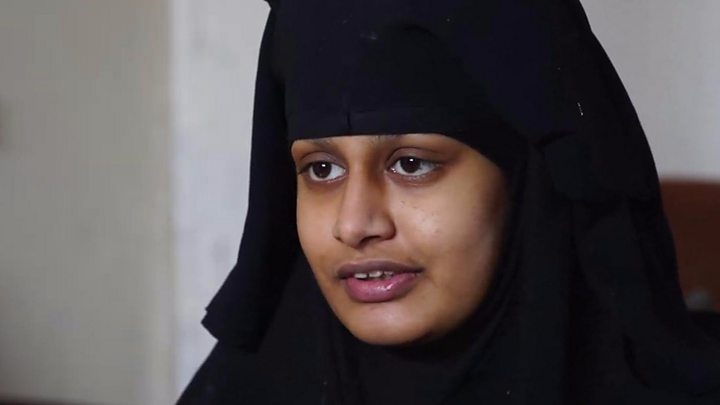
Referring to Ms Begum, Mr Ali told the BBC: "She has done wrong, I apologise to everyone as her father, to the British people.
"I am sorry for Shamima's doing. I request to the British people, please forgive her."
Mr Ali, 60, pointed out his daughter was a child when she travelled to Syria.
"She was under age at that time, she couldn't understand that much. I suppose someone influenced her to do that," he said.
"I admit that she has done wrong, whether or not she realised it."
He urged the British government and public to "take her back and punish her if she had done any mistake".
Asked whether he knew Ms Begum was being radicalised, he said he had "no idea".
In recent years he had lived mainly in Bangladesh, he said, visiting London for periods of between two and four weeks.
"I do not stay there more than that. I do not know much about her [lately]," he said.
"The time I stayed with Shamima, I never felt any such behaviour of going to Syria or joining IS."
By BBC News reporter Ethirajan Anbarasan - who interviewed Ahmed Ali
Mr Ali was looking frail, anxious and worried. He was surprised to hear that we had come all the way from London to talk to him.
He preferred to speak in his native Bengali language than English and he sounded very worried about his daughter's future. He couldn't explain how she got radicalised. But at the same time he also questioned how British immigration allowed her to travel on someone else's passport.
Living far away from the media gaze, Mr Ali seems to be living a quiet life with his second wife in Dawrai, a picturesque village in the district of Sunamganj.
His house was surrounded by coconut and mango trees and lush green paddy fields. A single track road, most of it potholed dirt track, leads to the village. Chickens and other birds were chirping all the time.
For Mr Ali, it must be a different world compared to his other home in noisy east London.
The home secretary has been criticised for refusing to allow Ms Begum to return to the UK with her child.
Ms Begum's sister, Renu, wrote to him two weeks ago on behalf of the family challenging the decision to strip her of her citizenship - which she described as "her only hope at rehabilition".
Ms Begum blamed inhospitable conditions in Syria for the deaths of two of her previous children.
In three months, more than 100 people have died on the way, or soon after, arriving at the camp, with two-thirds of those dying aged under five.
Share this with
These are external links and will open in a new window Read more about sharing.These are external links and will open in a new window
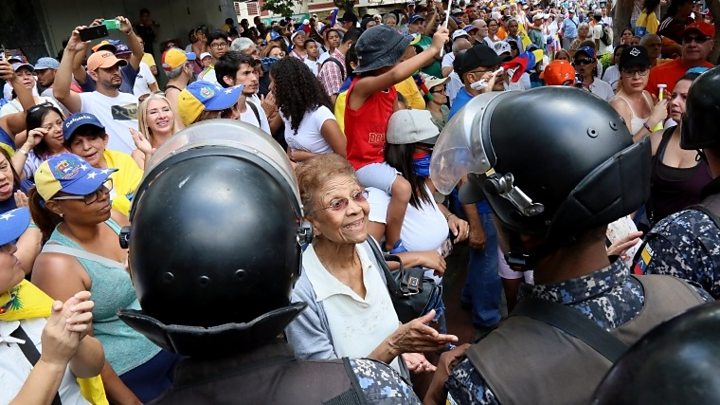
Rival demonstrations are taking place in Venezuela in response to calls by opposition leader Juan Guaidó and President Nicolás Maduro.
In the capital Caracas, some supporters of Mr Guaidó scuffled with police and were driven back with pepper spray.
Mr Guaidó declared himself interim president on 23 January and has been at loggerheads with Mr Maduro ever since.
Saturday's protests follow widespread power cuts that have affected much of Venezuela since Thursday.
Mr Guaidó, who leads the opposition-controlled National Assembly, has been recognised as interim president by more than 50 countries. However, Mr Maduro retains the support of the military and close allies including Russia and China.
On Saturday, police were out in force where the opposition march was taking place in Caracas.
Some protesters pushed against police in riot gear shouting "murderers" and the officers responded by firing pepper spray at them.
Addressing the rally later, Mr Guaidó announced he would embark on a tour of the country and summon all his supporters to attend a mass protest in Caracas "very soon".
"We are going to come, all of Venezuela to Caracas, because we need all of them united," he said.
Using a megaphone to be heard above the chanting crowd, he called on his followers to remain "united and mobilised... in the streets".
President Maduro, meanwhile, thanked the army for staying loyal to him, saying they had defeated an attempted opposition coup.
Speaking outside the Miraflores presidential palace, he referred to Mr Guaidó as "a clown and a puppet" of the US.
"They invited the armed forces to carry out a military coup and their reply was clear - they have defeated the coup plotters," he said.
President Maduro has accused Mr Guaidó of trying to mount a coup against him with the help of "US imperialists".
Mr Maduro took over the presidency when his late mentor Hugo Chavez died in 2013. In recent years Venezuela has experienced economic collapse, with severe food shortages and inflation reaching at least 800,000% last year.
The Maduro government is becoming increasingly isolated as more and more countries blame it for the economic crisis, which has prompted more than three million people to leave Venezuela.
The widespread power cuts have reportedly been caused by problems at the Guri hydroelectric plant in Bolivar state - one of the largest such facilities in Latin America.
A fresh blackout struck on Saturday, El Nacional newspaper reported, cutting power to many areas where it had previously been restored.
In Caracas, traffic lights in some areas were back in action but the city's metro remained closed, reports said.
Venezuela depends on its vast hydroelectric infrastructure, rather than its oil reserves, for its domestic electricity supply. But decades of underinvestment have damaged the major dams, and sporadic blackouts are commonplace.
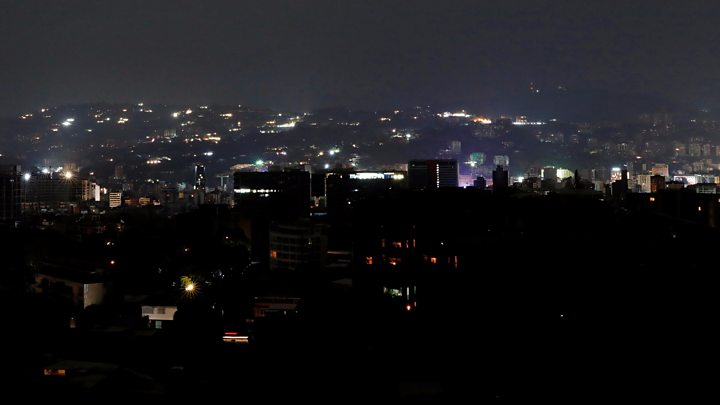
President Maduro said on Saturday that electrical substations had been attacked with "the support and assistance of the US".
"Many saboteurs have infiltrated the state's electrical company," he said.
"We have evidence and they will be held accountable. We will also introduce new measures to protect our electrical system from hackers."
Mr Guaidó says the blackouts are the result of years of under-investment.
On Friday, some hospitals saw chaotic scenes as relatives tried to move patients in the dark to other medical facilities with emergency power generators.
In Caracas's University Hospital, 25-year-old patient Marielsi Aray died after her respirator stopped working.
"The doctors tried to help her by pumping manually, they did everything they could, but with no electricity, what were they to do?" said her uncle Jose Lugo.
Generators at a Caracas children's hospital failed, with staff reportedly working overnight using their mobile phones for light.
Share this with
These are external links and will open in a new window Read more about sharing.These are external links and will open in a new window

The bodies of two climbers who went missing on a mountain in Pakistan have been found.
Briton Tom Ballard and Italian Daniele Nardi last made contact from Nanga Parbat at an altitude of about 20,700ft (6,300m) almost two weeks ago.
On Wednesday it was reported the search had been called off, but resumed when "silhouettes" were spotted on a passage taken by the climbers.
Officials have now confirmed the two "shapes" are the missing men.
Stefano Pontecorvo, the Italian ambassador to Pakistan, said Spanish climber Alex Txikon found the bodies on the Mummery Spur trail.
With great sadness I inform that the search for 🇮🇹 @NardiDaniele and 🇬🇧 Tom Ballard is over as @AlexTxikon and the search team have confirmed that the silhouettes spotted on Mummery at about 5900 meters are those of Daniele and Tom. R.I.P. #NangaParbat pic.twitter.com/vBmsRKJgKC
— Stefano Pontecorvo (@pontecorvoste) March 9, 2019
End of Twitter post by @pontecorvoste
Mr Ballard, 30, originally from Belper in Derbyshire, is the son of Alison Hargreaves, who died descending from the summit of K2 in 1995 - the same year she became the first woman to conquer Everest unaided.
Ahead of her death, he had moved to Fort William in Lochaber in the Scottish Highlands with his sister Kate and father Jim.
Mr Ballard and Mr Nardi, 42, last made contact with their team at base camp on 24 February as they tried to reach the summit of Nanga Parbat - the world's ninth highest mountain.
A number of deaths on the peak, which is notoriously difficult to climb, have earned it the nickname "Killer Mountain".
Mr Pontecorvo said the bodies were in a place that was difficult to reach but everything possible would be done to try and recover them.
Confirming the news on his official Facebook page, Mr Nardi's team wrote: "We are devastated by pain; we inform you that Daniele and Tom's searches are completed.
"Part of them will remain forever at Nanga Parbat."
They said Mr Nardi was a "lover of life and adventures, scrupulous, brave, loyal, attentive to details and always present in moments of need".
The statement added: "The family remembers Tom as a competent alpinist and brave friend of Daniele. Our thoughts are with him."
Writing on Facebook, Mr Ballard's girlfriend Stefania Pederiva said her heart was "completely drowned".
"There are or will never be words suitable to describe the void you left," she added.
"I thank the universe for giving me such a special person, there are only the wonderful memories of the times spent together that are the most beautiful of my life."
Searches for the men began days after they last made contact with their team, but these were delayed because of bad weather and tensions between Pakistan and India.
Mr Nardi, from near Rome, had attempted the Nanga Parbat summit in winter several times in the past.
In 2015, Mr Ballard became the first person ever to solo climb all six major north faces of the Alps in one winter.
He had been living in Italy's Dolomites mountain range with his father for the last few years.
Friend of the family Chris Terrill told the BBC they were a "mountain family" and said he accompanied Jim Ballard and his children on a trip to K2 after Ms Hargreaves died.
"It was an extraordinary expedition and it ignited something in Tom," he said.
"And no-one was going to stop him from following in his mother's footsteps.
"As tragic as his death is, he died doing what he loved."
One of Britain's most experienced climbers, Alan Hinkes, who knew Mr Ballard's mother, described their deaths as a great loss.
"This is one of the most dangerous, difficult mountains in the world, and in winter, I think if anything goes wrong, it happens pretty quickly," he added.
Follow BBC East Midlands on Facebook, Twitter, or Instagram. Send your story ideas to eastmidsnews@bbc.co.uk.
Share this with
These are external links and will open in a new window Read more about sharing.These are external links and will open in a new window
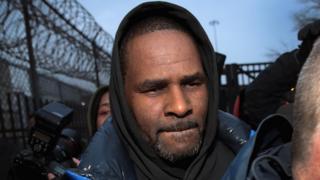
R. Kelly has been released from jail in Chicago after the $161,000 (£122,000) he owed in child support was paid.
The Cook County sheriff's office said the money was paid on Saturday morning and he was set free shortly afterwards.
It is unclear who made the singer's payment.
The embattled US R&B artist was last month charged with 10 counts of aggravated criminal sexual abuse, involving four alleged victims, three of whom were minors.
He pleaded not guilty to all the charges and was released on bail after spending three nights in jail. If convicted, he faces three to seven years in prison on each charge.
He was taken back into custody on Wednesday after failing to pay child support.
As he walked out of jail on Saturday, CNN reported him as saying: "We're going to straighten all this stuff out."
The singer had been prepared to pay up to $60,000 of what he owed to his former wife, Andrea Kelly, and their three children, but the judge had required the full amount and ordered him detained.
The singer's defence attorney had previously said the singer was having financial difficulties and his finances were a "mess".
R. Kelly has been a target of a boycott campaign, and his recording contract has been cancelled.
The latest stint in jail came shortly after an explosive interview with CBS This Morning, his first since his arrest in February on the aggravated criminal sexual abuse charges.
"I didn't do this stuff. This is not me," he said, adding that he is "fighting for my life".

Share this with
These are external links and will open in a new window Read more about sharing.These are external links and will open in a new window

A murder victim's mother said she was "shocked" her daughter's killer has been allowed out of prison on temporary release.
Ian Simms abducted and murdered Helen McCourt in 1988, but has never revealed the location of her body.
Ms McCourt's mother Marie told the BBC she was "angry" not to have been informed Simms had been allowed "in the public domain".
The Ministry of Justice said it did not comment on individual cases.
Mrs McCourt has led a campaign to introduce "Helen's Law" to block parole for killers who conceal the whereabouts of their victims' bodies.
Simms was photographed waiting for a bus in Birmingham by the Daily Mail.
He has never revealed the location of 22-year-old Ms McCourt's remains, maintaining he is innocent despite DNA evidence.
Mrs McCourt said: "I was shocked when I saw his face because I don't know what this man looks like [...] especially because he has been in for 31 years now."
She added she was also "relieved" as "that picture of him gives me at least some idea of what this man is like".
"But I am also angry because I want to know - and I will be getting in touch with probation on Monday - why I wasn't informed that he is in the public domain," Mrs McCourt said.
Her daughter vanished in February 1988 on her way home from her work as an insurance clerk.
Simms, whose pub was just yards from her home in Billinge, near St Helens, quickly became a suspect and he was convicted after her earring was found in his car boot.
He was jailed for life in 1989 and told he would have to serve at least 16 years before he could be considered for parole.
Last year, Mrs McCourt was told Simms had been outside his open prison - where he had been moved in 2016 - while accompanied by prison officers.
At the time she said a parole board officer had told her a prison governor intended to allow Simms to visit a town centre without supervision.
Mrs McCourt's MP Conor McGinn, who represents St Helens North, said he had "asked for an urgent meeting with the justice secretary" to discuss the case "but also to get some clarity" on the government's response to the Helen Law's campaign.
Mrs McCourt said she remained "hopeful that we will get Helen's Law but I really do think that parliament and ministers have to work a lot quicker".
Share this with
These are external links and will open in a new window Read more about sharing.These are external links and will open in a new window
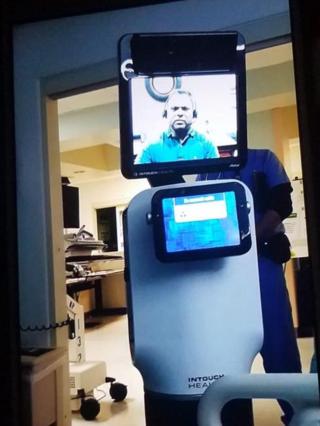

A doctor in California told a patient he was going to die using a robot with a video-link screen.
Ernest Quintana, 78, was at Kaiser Permanente Medical Center in Fremont when a doctor - appearing on the robot's screen - informed him that he would die within a few days.
A family friend wrote on social media that it was "not the way to show value and compassion to a patient".
The hospital says it "regrets falling short" of the family's expectations.
Mr Quintana died the next day.
Julianne Spangler, a friend of Mr Quintana's daughter, posted a photo of the robot on Facebook and said it "told [Mr Quintana] he has no lungs left only option is comfort care, remove the mask helping him breathe and put him on a morphine drip until he dies".
She later told BBC News that it was "an extremely frustrating situation", and "an atrocity of how care and technology are colliding".
"I think the technological advances in medicine have been wonderful, but the line of 'where' and 'when' need to be black and white," she added.
Mr Quintana's granddaughter, Annalisa Wilharm, who was with him at the hospital, also told the BBC that she was "trying not to cry".
"I look up and there's this robot at the door," she said, adding that the doctor on the screen "looked like he was in a chair in a room somewhere".
"The next thing I know he's telling him, 'I got these MRI results back and there's no lungs left, there's nothing to work with'. I'm freaking out inside, I'm trying not to cry - I'm trying not to scream because it's just me and him."
She added: "He just got the worst news of his life without his wife of 58 years."
When Mr Quintana's wife arrived, she complained to hospital staff about how the news was broken to her husband. Annalisa Wilharm said that Mr Quintana's wife was told by a nurse "this is our policy, this is how we do things".
Michelle Gaskill-Hames, senior vice-president of Kaiser Permanente Greater Southern Alameda County, said in a statement that its policy was to have a nurse or doctor in the room when remote consultations took place.
"The evening video tele-visit was a follow-up to earlier physician visits," she added. "It did not replace previous conversations with patient and family members and was not used in the delivery of the initial diagnosis."
She added: "That said, we don't support or encourage the use of technology to replace the personal interactions between our patients and their care teams - we understand how important this is for all concerned, and regret that we fell short of the family's expectations.
"We will use this as an opportunity to review how to improve patient experience with tele-video capabilities."
Share this with
These are external links and will open in a new window Read more about sharing.These are external links and will open in a new window


A film-maker whose body was found buried in a shallow grave had been strangled, police have said.
Laureline Garcia-Bertaux, 34, was found in her garden in Darell Road in Kew, west London, on Wednesday, after she went missing on Monday.
A post-mortem examination on Saturday gave the cause of death as "consistent with compression of the neck", the Metropolitan Police said.
A murder investigation is ongoing and there have been no arrests.
Ms Garcia-Bertaux, a French national who had been living in the UK for many years, was reported missing after failing to turn up for work at public relations firm Golin.
Murder detectives said they wanted to hear from anyone who might have spoken to her between 2 March and Wednesday.
"This may have been via phone calls, texts messages, WhatsApp or via any other social media platform," Det Ch Insp Simon Harding said.
"Laureline was known to local people as she walked her two dogs each day."
A forensic crime scene remains in place at the victim's home.
Ms Garcia-Bertaux was last seen on Saturday 2 March at a supermarket in the Manor Circus area of Richmond.
The Met had previously said her "disappearance is out of character".
Originally from Aix-en-Provence, Ms Garcia-Bertaux had worked with Dame Joan Collins on the 2018 short film Gerry, with the actress saying she was "shocked by the horrifying news" of her death.
Producer and actress friend Hester Ruoff described her as "an amazing individual" and said they had been due to start filming on a new movie next month.
Share this with
These are external links and will open in a new window Read more about sharing.These are external links and will open in a new window
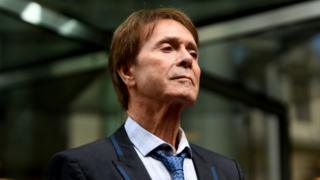
Sir Cliff Richard has joined other public figures calling for the law to protect the anonymity of people suspected of sexual offences until they are actually charged with a crime.
The star won a high-profile legal fight against the BBC after it aired live shots of police searching his home.
He says he would never have been named as a subject of inquiry had the law protected him as an innocent party.
The group wants to meet the home secretary to set out their case.
Sir Cliff mounted a groundbreaking privacy case against the BBC last year over its coverage of the raid by South Yorkshire Police.
The investigation - launched after police received what turned out to be false allegations of sexual assault - was subsequently dropped and police never arrested or questioned Sir Cliff.
The campaign group, called Falsely Accused Individuals for Reform (Fair), was launched by two other personalities who had been falsely accused of sexual offences and named in the media - the presenter Paul Gambaccini and former MP Harvey Proctor.
They argue it is time the law was changed to prevent innocent people being vilified in the media.
Sir Cliff has now announced he is joining them.
In a statement he said: "Being falsely accused myself and having that exposed in the media was the worst thing that has happened to me in my entire life.
"Even though untrue, the stigma is almost impossible to eradicate. Hence the importance of Fair's campaign to change the law to provide for anonymity before charge in sexual allegations and hence my continued work with Fair in the future.
"Had this proposed change in the law been enacted when the police decided to raid my apartment following the allegations of a fantasist, the BBC would not have been able to film this event, name me, and so plunge my life and those close to me into fear and misery."
Victims of sexual offences have automatic lifetime anonymity from being named in the media - but there is no bar on news organisations naming anyone who is under investigation for any type of offence.
There have been previous calls to prevent the media naming suspects before charge. The most recent debate came after a Sussex couple were arrested over last Christmas's Gatwick Airport drone disruption, named in the media, and then cleared of any wrongdoing.
The government has refused to back a proposal from the Liberal Democrat peer Lord Paddick for all suspects to be protected from being named before they are charged, saying it would infringe on freedom of speech.
But Daniel Janner QC, co-founder and secretary for Fair, whose father former Labour MP Greville Janner faced allegations of child abuse, said the campaign wanted to rebalance the scales of justice by focusing on a much narrower set of innocent individuals.
"We're trying to get balance because it's with sexual allegations that mud sticks in the most awful way," he said
"And that is why we want the Home Office to enact a small but significant change in the law."
"It is a privilege and honour that Sir Cliff has added his support."
Share this with
These are external links and will open in a new window Read more about sharing.These are external links and will open in a new window
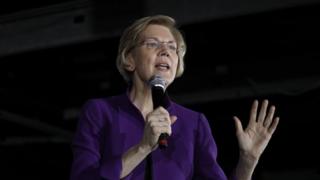
US Democrat Elizabeth Warren has proposed breaking up tech giants like Amazon, Facebook and Google if elected to the US presidency in 2020.
Seeking to stand out in a crowded Democratic field, Ms Warren told a crowd in Queens, New York, that she was "sick of freeloading billionaires".
Her regulatory plan would reverse some tech mergers and stop companies from competing on their own platforms.
This would promote competition and safeguard small businesses, she said.
Ms Warren pinpointed the Amazon acquisition of WholeFoods as one she would reverse, along with Facebook's merger with WhatsApp and Instagram, and Google's with Waze.
And she said she would halt practices such as Amazon selling on its own Amazon Marketplace platform.
She outlined her proposals in a post on the website Medium. The companies have not yet commented.
Amazon had planned to build a new headquarters close to where Ms Warren spoke but withdrew plans last month, blaming local leaders.
One woman at the rally, who was undecided about who to vote for, said: "What I like is that she's proposing big ideas."
Analysis by BBC North America reporter Anthony Zurcher
Elizabeth Warren was the first major Democrat to announce a 2020 presidential bid. She's since been joined by five of fellow senators, a current governor, a former governor and an ex-cabinet secretary, among others. Although she came out of the gate first, the pack has quickly caught up.
She's tried to stand out from the crowd by proposing a series of big, detailed progressive policies, including a "wealth tax" on multimillionaires, universal childcare and - in her latest move - using the government's anti-monopoly power to break up big tech companies.
She'll have a chance to make her case for it on Saturday in front of what could be a not-so-welcoming crowd, here at the South by Southwest technology conference in Austin, Texas. Politicians sometimes benefit from taking uncomfortable - and politically risky - stands in front of otherwise sympathetic audiences as a way to show a bit of spine.
There is still a very long road ahead for Ms Warren, and her competitors - many of whom will also be on the Austin stage this weekend. The Massachusetts senator is doing her best to be heard above the din - but so is everyone else.
A Massachusetts senator, she has a background in law and policy academia and sits on the progressive left of the Democratic Party.
She burst on to the national scene following the 2008 economic collapse, championing the creation of the Consumer Financial Protection Bureau - a government agency that would serve as a Wall Street watchdog and public advocate.
In 2010, following congressional passage of the Dodd-Frank financial reform bill, she helped the Obama administration set it up.
Two years later, Ms Warren rode that wave of attention to a seat in the US Senate, and on New Year's Eve she became the first major Democratic candidate to announce that she was planning a presidential bid.
Bernie Sanders has joined the race to stop Donald Trump from being re-elected. But who else has a shot at becoming the next president?
Share this with
These are external links and will open in a new window Read more about sharing.These are external links and will open in a new window
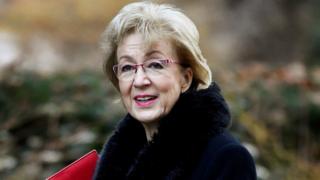
The government will not sign up to a Brexit agreement that breaks up the UK, Commons Leader Andrea Leadsom has said.
EU chief negotiator Michel Barnier said on Friday that the UK would be free to leave a proposed single customs territory with the EU - provided Northern Ireland remained within it.
The DUP - the party Theresa May relies on for a majority in Parliament - has rejected the proposal.
The plan is designed to avoid physical checks on the Irish border.
The UK is due to leave on 29 March, although Parliament has yet to agree the terms of withdrawal.
The UK and the EU remain at loggerheads over the contentious issue of the Irish backstop - which is designed to maintain an open border on the island of Ireland by keeping the UK aligned with EU customs rules until the two sides' future relationship is agreed or alternative arrangements are worked out.
The Commons Northern Ireland Affairs Committee has suggested there may be a possible technical solution to the border problem "but only if there is trust and goodwill".
On Friday the EU said it was prepared to include a number of existing commitments relating to the application of the backstop in a legally-binding document.
In a series of tweets Mr Barnier said the UK would not be forced into a customs union against its will through the Northern Ireland backstop.
He said it would be able to exit the single customs territory unilaterally if it chose to do so.
But, he added, Northern Ireland would remain part of the EU's customs territory, subject to many of its rules and regulations.
Mrs Leadsom said she was "deeply disappointed" by the proposal.
She told the BBC: "We will not break up the United Kingdom and have a border down the Irish Sea - so, I have to ask myself: what game are [the EU] playing?"
Brexit Secretary Stephen Barclay has also been dismissive of Mr Barnier's proposal.
Mr Barclay tweeted on Friday: "With a very real deadline looming, now is not the time to rerun old arguments.
"The UK has put forward clear new proposals. We now need to agree a balanced solution that can work for both sides."
The DUP said the proposal disrespected the constitutional and economic integrity of the UK, and was neither "realistic nor sensible".
The UK government has previously said it will not agree to anything which threatens the constitutional integrity of the UK.
But Sinn Fein leader Mary Lou McDonald backed Mr Barnier's position and said the Irish government needed to "hold firm" regardless of "pressure that might be applied from London".

Meanwhile, a report published on Saturday by the Northern Ireland Affairs Committee has suggested a "world first" mobile phone identification system could be the way to achieve invisible border controls.
The system would use either the mobile phone network or radio frequency identification to check goods or driver's IDs without them leaving the vehicle, in combination with a trusted trader scheme.
Border surveillance would utilise automated number plate recognition and CCTV.
Lars Karlsson, a former director at the World Customs Organisation, said all the separate elements which made up the proposal had been tested "somewhere in the world, just not in one single border".
The border in Northern Ireland would be "the first and a leading example in the world of this kind," he added.
However, the committee urged the UK and EU negotiators to agree on a definition of a hard border by 12 March.
"Mistrust over the backstop protocol has been heightened by lack of clarity on what exactly constitutes a 'hard border'," said chairman Andrew Murrison.
"My committee is calling for clarification of the term in a legally explicit way to ensure both parties share the same understanding of how the backstop can be avoided."
"Time is running out to reach common ground," the Conservative MP warned.
MPs are due to vote again on Theresa May's Brexit deal on Tuesday, but so far the UK has not secured any changes to the withdrawal agreement in its negotiations with Brussels.
UK and EU negotiating teams will meet again over the weekend but correspondents say there is little sign of a breakthrough.
The first Commons vote on the deal was rejected by 432 votes to 202 in January, the largest defeat for a sitting government in history.
Leading Brexiteers are unlikely to change their position on the deal unless Mrs May can secure promises that the backstop will not endure indefinitely.
Remainer Dominic Grieve, who supports a referendum to endorse the terms of Brexit, said it was "hard to see" how Parliament would agree to the current deal.
The Labour leadership is also unlikely to back Mrs May's deal.